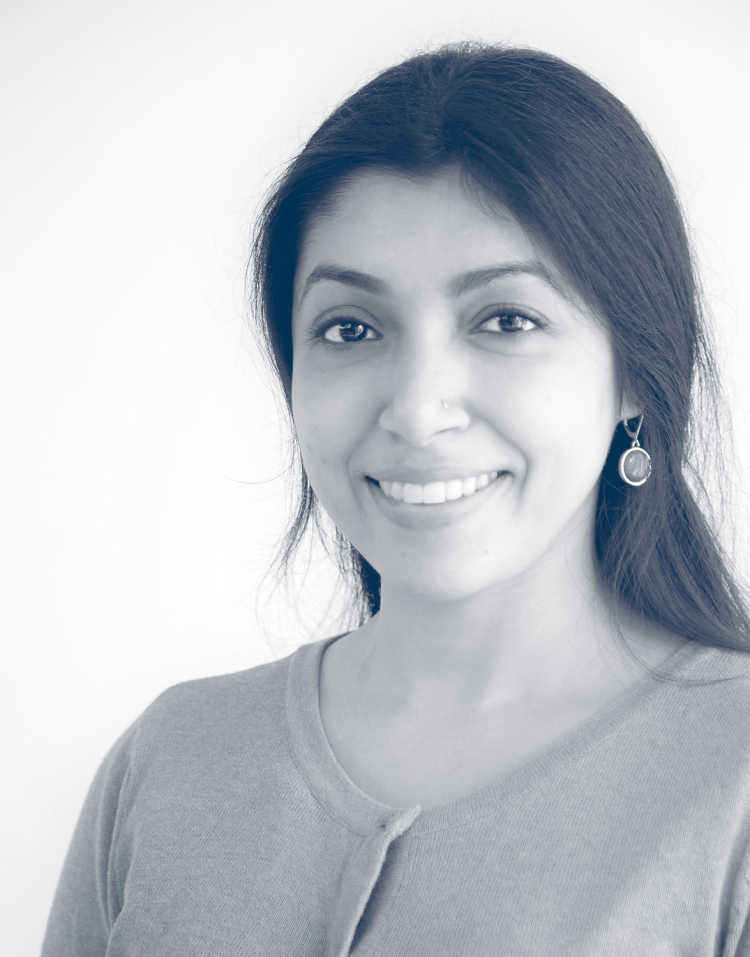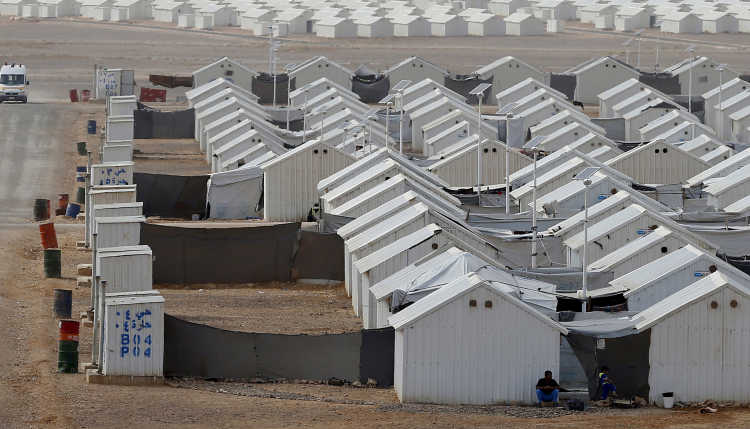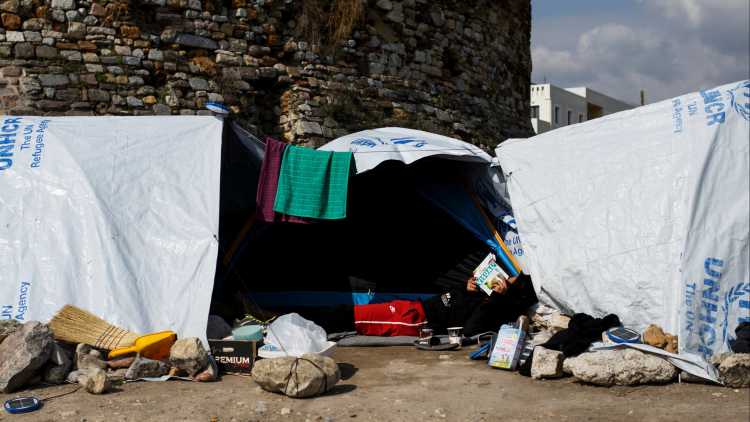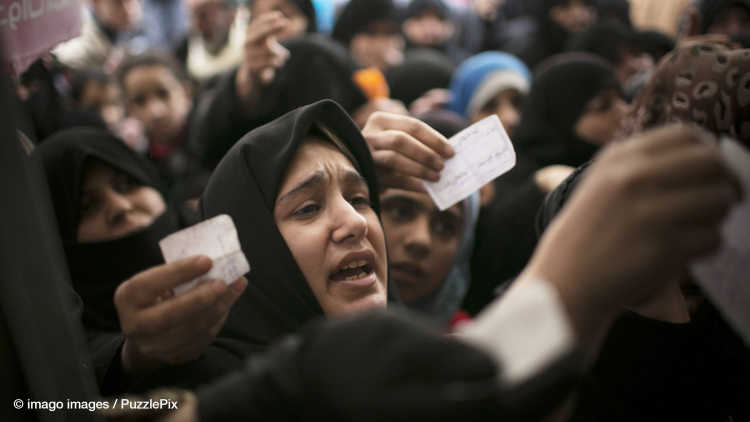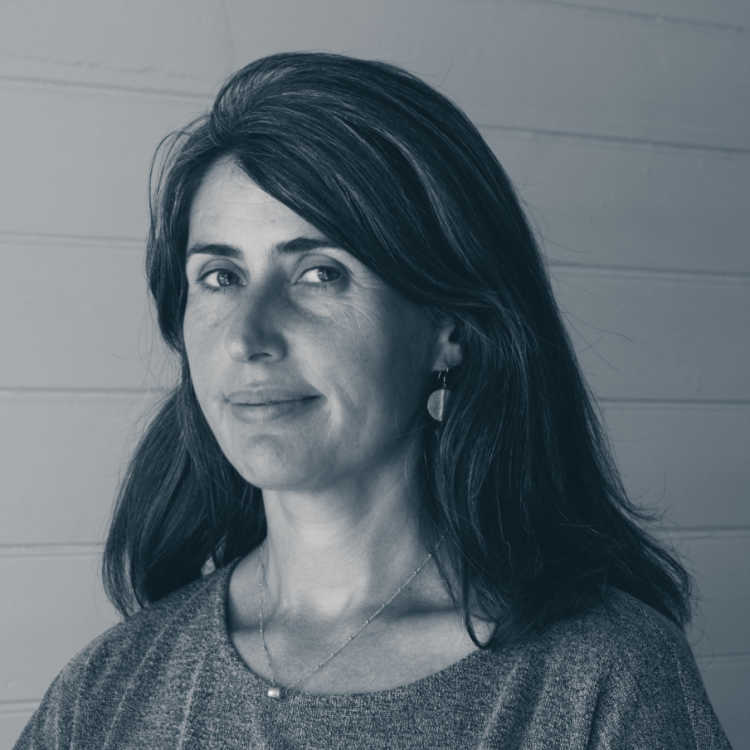- Startseite
- Publikationen
- GIGA Focus
- Refugee Perspectives on Migration Policy: Lessons from the Middle East
GIGA Focus Nahost
Geflüchtete und Migrationspolitik: Perspektiven aus dem Nahen Osten
Nummer 3 | 2020 | ISSN: 1862-3611

Weam Ghabash, Mustafa Hatip, Lea Müller-Funk, Rand Shamaa, Mouran Tourkmani
In a world with over 70 million people registered as forcibly displaced, governing migration has long been high on the European Union’s agenda. However, rather than emerging from evidence-based perspectives, policy responses have often been built on simplistic premises regarding how refugees’ mobility and decision-making work. Findings from the research project SYRMAGINE can contribute to the revising of these views:
While many Syrian refugees in Lebanon and Turkey strongly long for a return to their native country should the conflict end, returning under current conditions is perceived as unsafe – with individuals fearing military conscription or political persecution upon return, especially those opposed to al-Assad’s regime.
Often moderate aspirations to stay in the host country exist, even should the war end. Among refugees in Turkey, strong resistance to the idea of migrating to Europe is also prevalent. The consideration to settle down is based on a preference to remain geographically close to Syria, to live in a culturally familiar context, feelings of relative safety compared to Syria, family ties, and the notion that building a life worth living might be possible where one currently lives.
Factors which influence refugees’ decisions to move on to another third country are a combination of insufficient legal safety, financial vulnerability, and inadequate access to health and education services within the host country; views within families about onwards migration; and, refugees’ current life satisfaction and future imaginations.
Policy Implications
With ongoing violence in Syria alongside the legal and economic vulnerabilities faced by refugees in the Middle East, safe pathways to reaching third countries need to be expanded. In the Middle East itself, policies should focus on improving legal and educational conditions for refugees and supporting anti-discrimination measures. Return campaigns and refoulement have to stop immediately.
Migration Decision-Making of Refugees: A Missing Perspective in Policymaking
According to the United Nations High Commissioner for Refugees (UNHCR), there are 70.8 million forcibly displaced people worldwide today – of which 25.4 million are refugees. Syrians make up the biggest proportion: since 2011, 6.1 million have been internally displaced (IDMC 2018), 5.5 million have fled to one of Syria’s neighbouring countries, and around one million to Europe (UNHCR 2019). The topic of forced displacement is thus high on the European Union’s agenda. As a result, a variety of new policies have been put in place to govern mobile populations moving towards and residing in- and outside of Europe – such as the EU–Turkey deal in 2016, as well as the repeated attempts to establish “migrant reception centres” beyond the continent’s borders.
European policy responses usually build on certain premises regarding how refugees’ mobility and decision-making work. One routine assumption is that migrants are pulled to Northern or Western Europe because of better labour opportunities and more secure asylum conditions (Frowd 2019). European countries’ information campaigns, on the other hand, imply that welfare policies in destination countries and flawed risk assessments drive migration towards them, and thus posit that demystifying rumours would lead to lower levels of irregular migration. Some European governments have also argued that search-and-rescue missions in the Mediterranean Sea are a pull factor for migration. Local regimes in the Middle East meanwhile have strategically used migrants to exert diplomatic pressure on neighbours. In October 2019, for example, President Erdoğan warned that he would “open the gates” and send 3.6 million refugees to Europe if EU nations did not back him in his military ambitions in Northern Syria.
Despite the extensive political attention paid in Europe to “the migration crisis” in 2015, much less is known about the living conditions of refugees in Asia, Africa, or in Arab countries – and more specifically alternative migration trajectories within these contexts. To address this lacuna, the research project SYRMAGINE (Lea Müller-Funk: SYRMAGINE: Syrian Imaginations of Europe [2017–2019]) focused on Syrian refugees’ living conditions and migration decision-making processes in Lebanon and Turkey: How do Syrians see life in these two countries? What do they think about staying, returning to Syria, or moving on to another third country? To answer these questions, a standardised survey with 757 respondents as well as 41 in-depth interviews were conducted with Syrians living in four cities – Beirut, Tripoli, Istanbul, and Izmir – between March and July 2018 (Müller-Funk et al. 2019).
Increasingly Restrictive Policies towards Syrian Refugees ...
Syrian refugees face difficult legal conditions in both Lebanon and Turkey, but to divergent degrees. The Geneva Convention is not applied to Syrians in either country. In Lebanon, the government does not grant legal effect to UNHCR’s recognition of refugee status. Registered Syrians are thus theoretically considered to be waiting for resettlement to another country. Since 2015, new restrictions have made it increasingly difficult for Syrians to enter the country and renew residence permits. The work space of Syrians is concentrated in specific sectors such as construction, agriculture, cleaning, and garbage collection, or they work as waiters or hotel staff. In 2015, UNHCR registrations were suspended and the right to employment was barred for those already registered.
This legal framework has resulted in a situation where a vast number of Syrians lack valid residence permits and work under irregular conditions. Lebanon’s economic situation has worsened in recent years, further exacerbating refugees’ living conditions. Without a valid permit, Syrian refugees are considered to be in breach of the law and may be detained or forcibly returned to their native country. Authorities have repeatedly issued deportation orders informing refugees that they must leave (Janmyr 2018). The Lebanese government also pursues a no-camp policy: according to Lebanese political discourse, Syrian refugees should not stay in the country as Palestinians once did. Lebanese groups have repeatedly called for and indeed attempted to burn down the tents of Syrian refugees.
Syrians in Turkey have since 2014 been granted temporary protection (TP) under the Law on Foreigners and International Protection. The provisions of the TP regime include the right to legal stay, the principle of non-refoulement and a deportation ban, the right to health and education services, as well as principles governing the operation of and support in the camps (Toğral Koca 2016). However, the regulation falls short of providing an explicit right to work. TP holders can apply for a work permit, but there is no guarantee that government authorities will grant it (Ineli-Ciger 2014). Furthermore, due to a presidential decree it is possible to circumvent the principle of non-refoulement: namely, if there is a threat to public health, morality, or order. This has been used, for example, to deport Kurdish Syrians who support the People’s Protection Units (YPG) as well as Islamic State sympathisers back to Syria. In 2017 meanwhile, several municipalities such as Istanbul as well as cities on the Turkish–Syrian border stopped TP registration.
Pathways for these individuals to leave Lebanon and Turkey legally have remained restricted since the beginning of the Syrian conflict. Applications for work and study visas abroad have low chances of being accepted, and many Syrians do not have valid IDs in the first place. The Syrian passport ranks 105 out of 107 in terms of travel freedom according to the Henley Passport Index. In recent years, constraints on leaving Lebanon and Turkey have increased: Since the de facto closing of the Turkish–Syrian border in January 2016, Syrians in Lebanon are required to apply for a visa to enter Turkey. Over the past few years human rights organisations have pointed out that Turkish border guards continue to carry out pushbacks, injuring and even killing Syrians as they try to cross (Human Rights Watch 2018). Similarly, the Greek–Turkish border has been increasingly sealed off since the EU–Turkey deal; in early 2016 permits for travelling within Turkey were introduced meanwhile, hindering Syrians reaching cities in the west of the country. Furthermore, resettlement to a third country cannot be actively pursued and is only an option for a minority given UNHCR’s vulnerability criteria and the overall low number of resettlements. In Turkey, it is for example the Turkish Directorate General of Migration Management which identifies cases for resettlement consideration among registered TP beneficiaries and makes referrals to UNHCR.
… and Omnipresent Return Pressures
With the Bashar al-Assad regime re-establishing control over areas in central Syria and the south around Daraa and Ghouta, it has been trying to foster the image that the country is now entering a post-war phase. In a rare appeal in 2018, President al-Assad declared the country safe for Syrians to return to. However while violence has waned in many parts of the country, the impact of hostilities on civilians remains the principal driver of humanitarian needs. Torture and disappearances continue, and an estimated 11.7 million people were in need of various forms of humanitarian assistance in Syria in 2019 (UNHCR 2019). In 2019/2020, the government offensive against the last rebel enclave Idlib led to 520,000 new displacements.
In both Lebanon and Turkey, political leaders have started to put pressure on Syrian refugees to return, and policies have been put in place to facilitate it through formal and informal actors (Fakhoury and Ozkul 2019; Şahin Mencütek 2019). Hezbollah, al-Assad’s ally in Lebanon, opened several offices across the country for refugees to register for return. The Turkish government increasingly encourages return to opposition-controlled areas by collaborating with local pro-Turkey actors. But, returning has direct legal consequences for Syrians in both of these host countries: In Lebanon, the Directorate of the General Security, depending on the Ministry of Interior, stamps each passport at the border to ban its owner from returning for an undefined period of time. In Turkey, voluntary departure is considered grounds for the cessation of TP and refuge cannot be again sought afterwards (Refugee Rights Turkey 2017).
Legal and Economic Vulnerabilities across Educational Attainment
Descriptive statistics from the SYRMAGINE survey reveal respondents’ diverse educational backgrounds and high levels of economic and legal vulnerability, especially in Lebanon where living conditions for Syrians are particularly precarious. Overall, 38 per cent of respondents had no education or had attended primary school only. Some 34 per cent attended lower secondary school (Grades 7–9), 12 per cent higher secondary school (Grades 10–12), and 16 per cent university or equivalent, reflecting how all layers of Syrian society have been affected by displacement. While the percentage of respondents with no or only primary education was roughly similar across the two countries, the share who had attended upper secondary school or university was higher in Turkey (see Figure 1 below).
Household incomes were altogether low and insufficient, despite the vast majority of (male) respondents working – mostly in the informal sector. Around half of respondents lived in a household with an income of maximum USD 400 per month. Household income levels were significantly lower in Lebanon, with 16.5 per cent of respondents living off maximum USD 200 monthly (see Figure 2 below). Many reported to have borrowed money in the past 12 months (see Figure 3 below).
Employment rates were roughly similar, with 90 per cent of male respondents and 18 per cent of female respondents working. Half of the survey respondents had a legal status in the two host countries, but the figures differed significantly: of those residing in Lebanon 28 per cent had a legal status, versus 82 per cent in Turkey. This reflects that in Turkey, TP automatically grants a legal stay – which is not the case in Lebanon (see Figure 4 below). Overall life satisfaction hence varied significantly: on a scale of 1 to 10, it was 4.1 in Lebanon and 5.4 in Turkey on average.


High Return Aspirations and Low Return Movements
In order to explore whether Syrian refugees in Lebanon and Turkey aspire to return home, respondents were asked what their preference would be under the hypothetical scenario that the war in Syria were to end. On average, findings indicate a strong longing to return to Syria in this case (40 per cent), with significantly higher such aspirations in Lebanon (48 per cent) than in Turkey (31 per cent) (see Figure 5 below). This can be largely explained by the particularly hostile official stance towards refugees and the dire economic situation in Lebanon. However while many respondents aspired to return to Syria in the future, doing so under current conditions was described as unsafe – given fears of military conscription or political persecution upon return, especially among those opposed to the current regime. Many reported that they did not know what would happen to them if they returned, and some believed that the regime might generally categorise refugees as political opponents. Others were afraid of being unable to return to Lebanon or Turkey if they had to flee Syria once more. Some mentioned that a lack of financial resources alongside difficulties in reclaiming property in Syria because of no documentation for it were further major obstacles.

While 40 per cent indicated simply aspiring to return should the war end, a further 25 per cent made it conditional on the outcome thereof. Many cited the existence of safety and security, a halt to general violence, a change of regime or in the security apparatus, access to former property, the availability of basic services, and the economic situation in Syria in this regard. Conditional return was more prevalent among respondents in Turkey (33 per cent) than in Lebanon (17 per cent), which can be related to both better overall living conditions and likely a higher number of regime-critical refugees in the former.
As a woman in Tripoli explained:
As long as Bashar al-Assad is present, we won’t return, there is no safety. If they said ‘Bashar will be removed from power,’ we would all return. But if there is no security, how should we return? They say ‘we will repair your houses, we will rebuild,’ but it’s all a lie. There is no safety.”
The survey also found complementary aspirations to stay assuming the war had ended, which were higher in Turkey (23 per cent) than in Lebanon (10 per cent). It therefore came as no surprise that 11 per cent in Turkey and 24 per cent in Lebanon wanted to migrate onwards to another country even if the war should end. Overall, 29 per cent of respondents had attempted to leave one of the two host countries since 2011: some 25 per cent in Turkey versus 32 per cent in Lebanon. In Turkey, strong resistance to the idea of migrating to Europe was also simultaneously prevalent: of respondents, 58 per cent cited not wanting that even if given the necessary papers (Müller-Funk 2019).
Reasons for Staying
To learn more about the reasons for wanting to stay in either Lebanon or Turkey, we conducted narrative interviews. Commonalities emerged: Over time, refugees had given up hope that a safe return would be possible in the foreseeable future but still wanted to remain geographically close to Syria, so as to be able to eventually return or at least visit the country sporadically in the future. Some had forfeited property in Syria and had no close family members left there meanwhile, but had a preference to live in a society which felt culturally close to their own one. They had often adapted life aspirations in a way that was acceptable for them, for instance by managing to continue working in the same profession as they had done prior to displacement. Interviewees often described how they had lived through their loss, grown used to a new life, and decided to focus on the present (Müller-Funk 2019).
One interviewee, for example, explained how she adapted her original life plan of becoming a teacher to that instead of being a mother devoted to her children’s education for the time being:
“I started to know Turkish, last year I learned Turkish. I started to give lessons, and I started to feel alive again. I felt that there is an importance to my existence, the grades of my son improved. Before, I had an objective and a dream. To teach a particular section of students, to change their lives. At the moment this dream is far away, the language barrier is still there. Maybe in the future there is a way.”
Even if working conditions were often experienced as harsh and exploitative, interviewees could thus imagine building a life in the host country, and saw professional and personal opportunities given – or despite – the legal context and acute discrimination. Some also perceived the host country as relatively safe compared to what they had lived through and known in Syria.
One young man who had deserted the army in Syria described how he felt in Turkey as follows:
“It is better here than in Syria, from my point of view, because as a soldier […] I came and I had much more freedom. No one owns me here. Nobody can tell me: ‘Go here, go there,’ no. I became free.”
Reasons for Moving On, and Feeling “Stuck”
SYRMAGINE results also reveal that it is a combination of political, economic, societal, and individual factors at the macro, meso, and micro levels that motivate refugees to consider migration to another third country (onwards migration). On the macro level, considerations to move on were motivated by insufficient legal safety, financial vulnerability, and inadequate access to health and education services.
On the meso level, decisions about onwards migration were mostly taken within the family: Parents pointed out that they would leave for their children’s sake and often decided that the father should do so first, while his wife stayed behind with the children and would join later when it was considered safer to do so. At the same time, the decision to pursue onwards migration left more room for individual-level choices, especially for single adults: interviewees had sometimes gone against the will of their parents, who considered smuggling too risky or who were against the idea of their children moving even further away.
On the micro level, the results highlight the importance of life satisfaction, future imaginations, and the hope (or lack thereof) for an impending return to Syria. Those who aspired to move on were often profoundly dissatisfied with their current existence and were convinced that migration would help to achieve broader life goals elsewhere. Interviewees often felt deprived of the life that could have been if the conflict had never happened. Those who aspired to move on even if the war ended, for example, typically had a slightly higher educational background and lower life satisfaction. Respondents who embraced the idea of moving on often had “a project” to realise eventually in a different location. They had strong imaginations about building up a better – and stable – life elsewhere, especially in Western (European) countries. Educational aspirations were dominant among those who wished to migrate onwards, reflecting the fact that a good education is out of reach for many Syrian children and youth (especially in Lebanon).
A young woman in Tripoli stated for example:
“I know that I cannot live the coming seven or eight years in the same difficult conditions, in one place. I don’t want to arrive at a point where I cannot learn anything, I know where I am going, and what the difficulty is, and that there is no return to Lebanon. But it’s necessary to take risks in life, at least to be able to finish my studies.”
On the whole, imaginations about destination countries seemed to be more instrumental – meaning about fulfilling one’s life project – than orientated towards a particular destination. Interviewed Syrians aspired to live in a place where they had existing ties, a community support network, language skills, and could imagine creating a life for themselves. They gathered information about risks involved when travelling to Europe through their own personal networks, and contrariwise did not consider that from awareness campaigns about the perils of migrating irregularly.
One key finding was that the majority of interviewees could not realise their aspirations regarding either return or onwards migration. While many retained a profound belief in the former, there was a strong mismatch between hypothetically aspiring to it and actually being able to realise return. Some reported that reflections on returning right now were not influenced by a wish to do so per se but rather by family obligations back in Syria, financial and legal vulnerability, and insufficient access to healthcare in the host country, which motivated some to consider return even under conditions of high uncertainty and risk (Müller-Funk and Fransen 2020). On the other hand, those who envisaged and planned to move on to Europe were often those who had the financial means to cross borders irregularly, who had extended social networks abroad, and who were willing to take significant risks. Many interviewees (especially in Lebanon) reported feeling stuck: neither being able to return nor to move on as they wished to.
As a male respondent in Beirut rued:
“I was the last person to leave Syria, I did not think that I would ever leave. I don’t like this country; you cannot live here. I am one of those people who likes people, I like to have friends, I like to go out, I like to move. Here, everything is forbidden. It’s like a prison here. I just move from here to my work and from my work back to here. I cannot move.”
Reflecting on the Consequences: Including Refugees’ Perspectives
Recent international efforts to find solutions to forced displacement have emphasised that an approach is needed that favours refugees’ inclusion and participation (Global Compact on Refugees 2018). While the willingness to include refugees’ perspectives in EU policy has been repeatedly articulated (Action Plan of the Partnership on Inclusion of Migrants and Refugees 2017), some have questioned whether this is merely a box-ticking exercise rather than genuine inclusion however.
One of SYRMAGINE’s core objectives was to provide better data about refugees’ own standpoints, as a basis for designing evidence-based policies. Refugees participated in data collection and analysis for the project too. Except for the principal investigator, all of the other four authors contributing to this text have experienced displacement from Syria to Lebanon or Turkey themselves, and have worked for different non-governmental organisations providing services to refugees. Based on this bottom-up approach, a number of policy recommendations can be formulated.
We found that returning to Syria under current conditions is in many cases coerced, and can potentially lead to re-displacement – internally or externally. With the conflict still ongoing and different foreign and local armed groups continuing to dominate the divided parts of the Syrian landscape, no end to violence and political persecution is on the horizon – at least in the near future. First, some will never be able to return safely to Syria as long as the current regime remains in power. Second, from a legal perspective, Lebanon and Turkey cannot be considered safe countries as long as refoulement persists and the Geneva Convention is not applied to Syrian refugees – even if many prefer to stay in the Middle East region and await a potential return. It is our recommendation that, for the time being, policy measures should thus focus on the following:
expanding safe and legal ways to reach third countries;
supporting refugees’ empowerment and strengthening anti-discrimination in Lebanon and Turkey; and,
halting return campaigns or refoulement in any form, as return should be voluntary, safe, dignified, and sustainable.
(1.) Measures to expand safe and legal ways to third countries
Increase resettlement: Both the number of countries participating in UNHCR’s resettlement programmes and annual quotas for resettled refugees should be increased significantly among those which have ratified the Geneva Convention. This would reduce the vulnerability of the countries most affected by the refugee crisis.
Introduce humanitarian visas: Provide the possibility to apply for asylum at the consulates of countries who uphold the International Refugee Protection regime. This would reduce the number of refugees entering third countries irregularly and would allow less well-off and more risk-averse individuals to access safety elsewhere. Instead of spending their savings on smugglers, refugees could use them to rebuild their lives in a new country.
Expand sponsorship programmes: Introduce large-scale private and association-based sponsorship programmes for refugees. This would entail a group of individuals or an association from a safe host country sponsoring a refugee to support his or her resettlement. Such sponsorships would allow individuals and civil society actors in host countries to actively support refugees in building up an independent life in the host country.
Revise the Dublin Convention: This legal instrument puts disproportionate asylum responsibility on southern European member states. Many interviewees could not imagine to make a life in Greece given the shocking conditions on the country’s islands.
Stop awareness campaigns on the risks of irregular migration: Most refugees do not consult this type of material when taking migration decisions. This would make funds available for alternative, more useful measures.
(2.) Measures to support empowerment and social cohesion in Lebanon and Turkey
Share the financial burden: Increase international funds to provide tangible and rapid support to countries under the greatest pressure, especially those with high numbers of refugees, significant unemployment rates, and insufficient access to healthcare services – which are particularly prone to shocks. The current COVID-19 pandemic, for example, has resulted in a sudden loss of income for many refugees in Lebanon and Turkey.
Continue advocacy for the International Refugee Protection regime: Support local organisations and NGOs in their advocacy and monitoring activities in countries which do not fully apply the Geneva Convention or have no national asylum law to advocate for refugees’ legal and health protection, as well as to protect refugees from forcible return.
Provide the right to work: Provide refugees registered with UNHCR and holders of TP automatically with a residence permit which grants the unrestricted right to earn a living. Meaningful opportunities for qualified refugees should be created within local labour markets. However, the right to work should not be confused with self-reliance. Clear mechanisms should be put in place to support unemployed or disabled refugees.
Support social cohesion: Support conflict-sensitive peace-building projects which aim at recognising the vulnerabilities at both the refugee and host-community levels, especially in the fields of professional training and cultural initiatives. These should include empowerment projects for women – such as cooperatives, joint vocational trainings, courses for the illiterate – as well as neighbourhood workshops and joint dinners to create spaces where refugees and locals can exchange experiences and fears. Levantine cultural centres that can acquaint host communities with Syrian music, cuisine, and culture should also be created.
Promote education: Youth can be bridge-builders and reduce discrimination and prejudice against refugees. Train teachers in how to deal with refugee students, especially those suffering from discrimination and post-traumatic stress disorder. Set up recreational activities for both local and refugee children. Include displacement as a topic in school and university curricula. Create specific scholarships for refugees to facilitate their access to higher education.
Strengthen language training: Increase Turkish-language training for Syrian refugees there, for instance in refugee camps, factories, vocational centres, and schools, and introduce language courses for mothers – alongside childcare facilities. Governments could provide incentives to employers for sending employees to language-training courses.
(3.) Measures to support voluntary, safe, dignified, and sustainable return
Stop automatic loss of protection because of a “go-and-see visit” to Syria: Refugees who decide to return individually in order to obtain a more complete picture of conditions in Syria before deciding their next steps should not be penalised. They should be able to return to protection if conditions in the country of origin remain unsafe.
Protect property rights: Access to former property is a key element in refugees’ return decisions, and so advocating for these individuals being granted related documentation is vital. Consider voices and initiatives from within Syrian civil society, which have lobbied for fair property rights.
Funding
This project has received funding from the European Union’s Horizon 2020 research and innovation programme under the Marie Skłodowska-Curie grant agreement No. 748344
Fußnoten
References
European Commission (2017), Action Plan Partnership on Inclusion of migrants and refugees.
Fakhoury, Tamirace, and Derya Ozkul (2019), Syrian Refugees’ Return from Lebanon, in: Forced Migration Review, 62, 26–28.
Frowd, Philippe M. (2019), Producing the “Transit” Migration State: International Security Intervention in Niger, in: Third World Quarterly, 1–19.
Ineli-Ciger, Meltem (2014), Implications of the New Turkish Law on Foreigners and International Protection and Regulation No. 29153 on Temporary Protection for Syrians Seeking Protection in Turkey, in: Oxford Monitor of Forced Migration, 4, 2, 28–36.
Janmyr, Maja (2018), UNHCR and the Syrian Refugee Response: Negotiating Status and Registration in Lebanon, in: The International Journal of Human Rights, 22, 3, 393–419.
Müller-Funk, Lea, SYRMAGINE: SYRIAN IMAGINATIONS OF EUROPE, http://leamuellerfunk.com/index.php/syrmagine-project/ (18 May 2020).
Müller-Funk, Lea, Osama Alaa Aldien, Arij Basrak, Weam Ghabash, Mustafa Hatip, Rand Shamaa and Tourkmani, Mouran (2019), Researching Urban Forced Migrants in Turkey and Lebanon: Alternative Ways to Study a Vulnerable Population in Fragile Political Contexts, Amsterdam: IMI Working Paper, 151.
Müller-Funk, Lea (2019), Adapting to Staying, or Imagining Futures Elsewhere: Migration Decision-making of Syrian Refugees in Turkey, Amsterdam: IMI Working Paper, 154.
Şahin Mencütek, Zeynep (2019), Encouraging Syrian Return: Turkey’s Fragmented Approach, in: Forced Migration Review, 62, 28–31.
Toğral Koca, Burcu (2016), Syrian Refugees in Turkey: From “Guests” to “Enemies”?, in: New Perspectives on Turkey, 54, 55–75.
UNHCR (2018), The Global Compact on Refugees, final draft.
Gesamtredaktion GIGA Focus
Redaktion GIGA Focus Nahost
Lektorat GIGA Focus Nahost
Regionalinstitute
Forschungsschwerpunkte
Wie man diesen Artikel zitiert
Ghabash, Weam, Mustafa Hatip, Lea Müller-Funk, Rand Shamaa, und Mouran Tourkmani (2020), Geflüchtete und Migrationspolitik: Perspektiven aus dem Nahen Osten, GIGA Focus Nahost, 3, Hamburg: German Institute for Global and Area Studies (GIGA), https://nbn-resolving.org/urn:nbn:de:0168-ssoar-68195-4
Impressum
Der GIGA Focus ist eine Open-Access-Publikation. Sie kann kostenfrei im Internet gelesen und heruntergeladen werden unter www.giga-hamburg.de/de/publikationen/giga-focus und darf gemäß den Bedingungen der Creative-Commons-Lizenz Attribution-No Derivative Works 3.0 frei vervielfältigt, verbreitet und öffentlich zugänglich gemacht werden. Dies umfasst insbesondere: korrekte Angabe der Erstveröffentlichung als GIGA Focus, keine Bearbeitung oder Kürzung.
Das German Institute for Global and Area Studies (GIGA) – Leibniz-Institut für Globale und Regionale Studien in Hamburg gibt Focus-Reihen zu Afrika, Asien, Lateinamerika, Nahost und zu globalen Fragen heraus. Der GIGA Focus wird vom GIGA redaktionell gestaltet. Die vertretenen Auffassungen stellen die der Autorinnen und Autoren und nicht unbedingt die des Instituts dar. Die Verfassenden sind für den Inhalt ihrer Beiträge verantwortlich. Irrtümer und Auslassungen bleiben vorbehalten. Das GIGA und die Autorinnen und Autoren haften nicht für Richtigkeit und Vollständigkeit oder für Konsequenzen, die sich aus der Nutzung der bereitgestellten Informationen ergeben.








